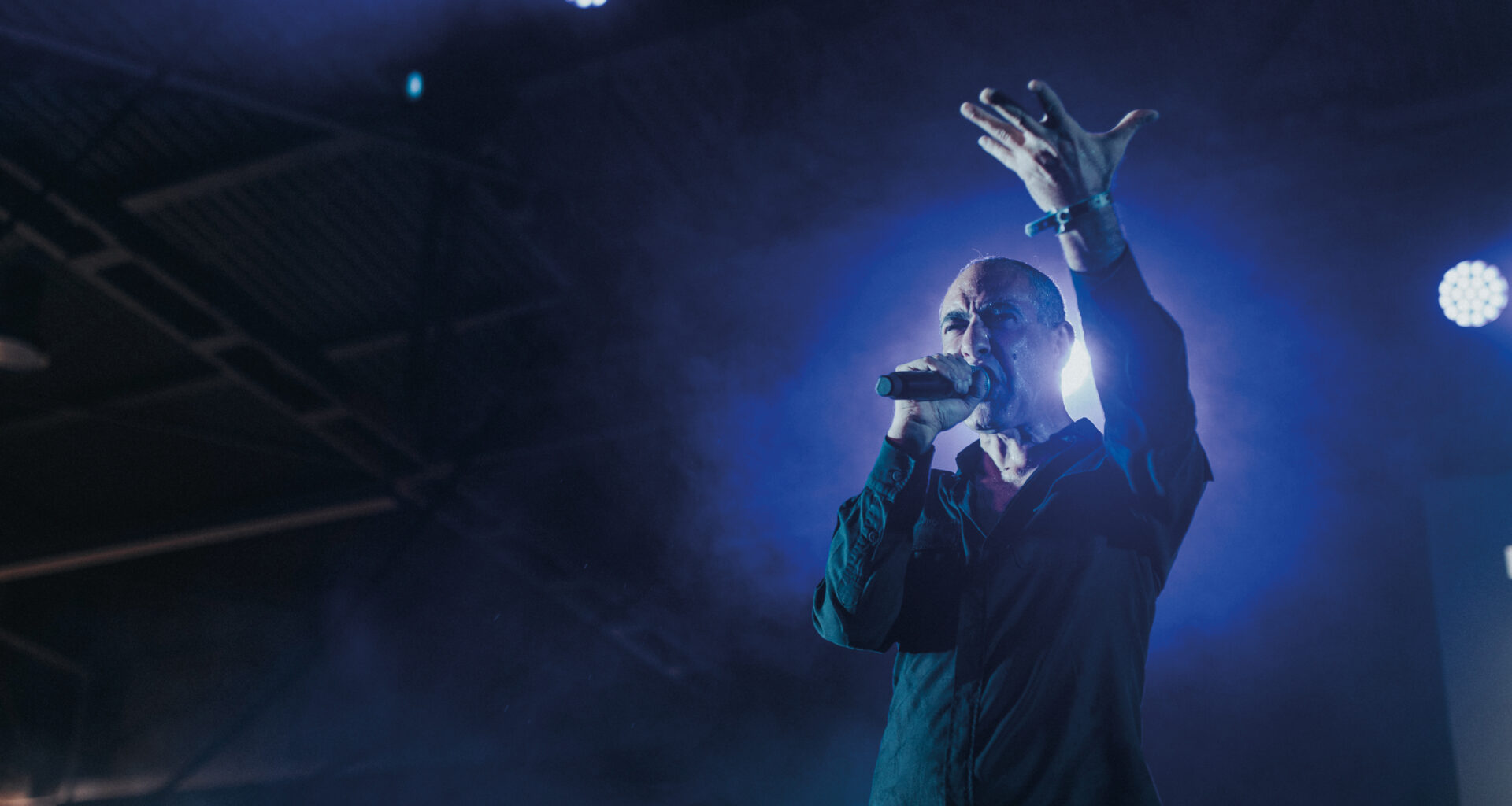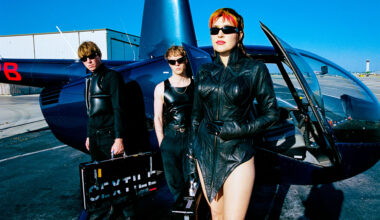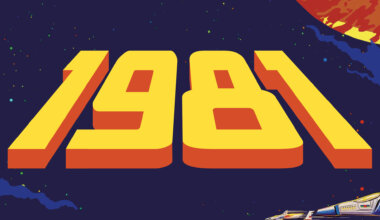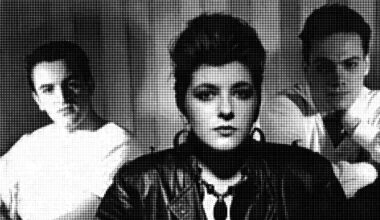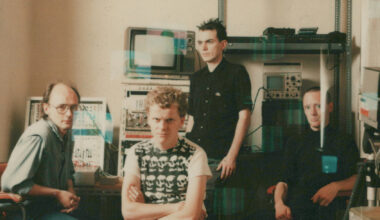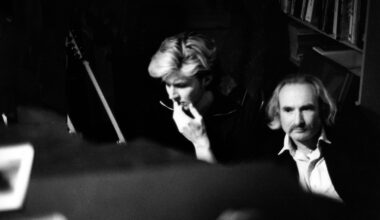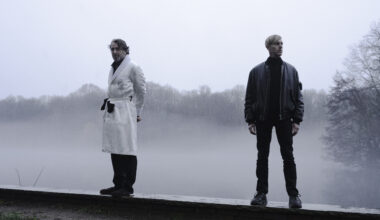You join us in Germany, where Deutsch Amerikanische Freundschaft (DAF to their friends) treat a large, expectant festival crowd to a proper sonic hosing, industrial style. They’ve clearly lost none of their edge in a mere 30-odd years of doing things their own way…
Gabi Delgado-López, DAF’s Spanish-born frontman, is pouring bottle after bottle of cold water over his head. Not that he’s trying to have – as per their famous track – ‘Sex Unter Wasser’, although carnal thoughts are never far from his mind as we shall find out later. Nor is he attempting to create that look of glistening hard-bodied musculature for which the German duo made their name, well, that and their brutally insistent Eurotronica. No, apparently it helps with his circulation. He was onstage one night, suffering whatever the effects of bad circulation are, when he realised that drenching himself with chilled Evian had an immediately ameliorating effect. As a result, it has become part of his live strategy.
DAF are onstage, playing to a huge indoor crowd, treating several thousand goth, industrial, metal and heavy electronica fans at the M’Era Luna festival in Hildesheim, south east of Hanover, to such classic phuture trax as ‘Als War’s Das Letzte Mal’, ‘Absolute Körperkontrolle’ and ‘Der Mussolini’, the latter their most notorious subversion of totalitarian stürm und drang. Robert Görl is behind his drum kit, headphones on, his rhythms at once man-made and machine-like, evincing the lure of DAF’s power, while Delgado prowls the stage, emitting a series of guttural exhortations: staccato beat meet stentorian bark.
Delgado puts his foot on one of the monitors, a rare gesture from an act who were all about rejecting rock convention. Each song, each monstrous matrix of cyber circuitry, is greeted like a massive pop hit.
Unsurprising perhaps considering DAF were, at their height in 1981, Germany’s fifth biggest German-speaking band.
As their brand new retrospective boxset ‘DAS IST DAF’ demonstrates, the duo are a mighty monolith who loom as large in some imaginations as fellow Düsseldorfians Kraftwerk: “The godfathers of techno,” as John Peel once hailed them. In fact, it would be easy to argue that DAF’s punishing Korg-disco was as influential as Kraftwerk’s serene synthscapes.
“We get so much respect from people,” says Görl, 62, the shorter, stockier of the pair, in the lounge of a Hanover hotel after the gig. “Some of them are famous guys who say, ‘We started making music because of you’.”
Pushed to name names, he offers Rammstein, but he could have mentioned any number of confrontational techno-noiseniks.
“The important thing is it’s people from all different scenes,” adds Delgado, 59, the taller, rangier one, with the air of a cool college lecturer, all dry now and enjoying a plate of post-gig fruit. “Techno DJs, EBM, EDM, industrial, Chicago house, electro, electroclash, tecktonik, we get respect from them all.”
When asked where he imagines DAF might be stocked in a record store these days, he replies, after some consideration, “future afro”, at which he and Görl crack up.
DAF’s impact on the course of electronic sound is no laughing matter. They gave it a raw, rough edge: as Delgado puts it, they “didn’t want this clean Düsseldorf office sound” that he ascribes to their city rivals, Kraftwerk. Görl, who grew up in an orphanage, and Delgado, who terms himself “an immigrant”, came from the poor end of town.
“The wrong side,” laughs Delgado. “The Kraftwerk guys were all rich kids.”
One early DAF single was ‘Kebabträume’, about Turkish “guest workers” in Germany.
“In a way,” admits Delgado, “it was about us, we came from a low social order.”
Görl studied classical music at the Leopold Mozart Conservatory in Augsburg before moving to the University of Graz in Austria, where he focused more on jazz. As for Delgado, he was a fierce autodidact.
“I never went to university,” he says. “I had my own private university where I read about Russian constructivism, art and films.”
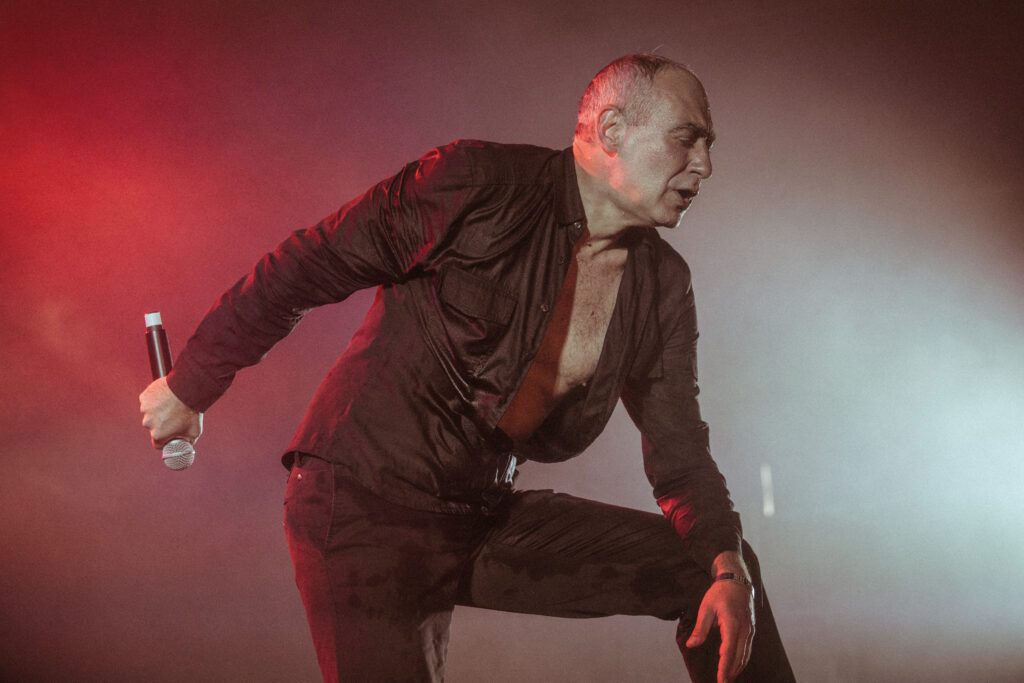
He and Görl met at the Ratinger Hof club, Düsseldorf’s own CBGBs, in 1978. Görl was a jazz virtuoso, Delgado a veteran of several punk bands who preferred the black music of his youth.
“I appreciated the energy and do-it-yourself aspects of punk, but I thought the music was shitty,” he says. “I liked disco, funk, ‘The Sound Of Philadelphia’, Chic, Parliament and old soul.”
Delgado and Görl, early German adopters of punk, knew that to extract any value out of the insurrectionary new movement, it would have to be remade/remodelled in their own image.
“There were some Düsseldorf punks who wanted to imitate the British punks, but we said no, we’re German punks,” Delgado recalls. “We dressed differently, we wore silk stockings with Doc Martens and short trousers with a leather jacket and safety pins. It was a crazy mixture.”
If they didn’t take to the British punks’ couture, they were even more hardline about their UK counterparts’ sonics.
“We were very ideologically clear,” Delgado confirms. “No. British. Imitation. I didn’t understand why they played bad rock ‘n’ roll, such old-fashioned music. I wanted to get out of this classic punk movement. I was more interested in Dada than The Damned.”
DAF’s formation coincided with the new wave of DIY electronic music by the likes of Robert Rental, Daniel Miller’s alias The Normal and Thomas Leer. Were they familiar with it, even inspired by it?
“No, no, no,” Delgado insists. “I’ve never looked at other guys.”
“We knew Daniel Miller,” Görl adds, “but it wasn’t a theme to orientate us.”
“When we started,” Delgado continues, “we had a rule: we wanted to create a music that didn’t exist. We didn’t want to be part of any tradition, not punk, not krautrock, not German electronic music, no tradition at all. If we made any tracks that reminded us of anyone else in some small way, we threw them away.”
“If they reminded us of The Normal, we threw it away,” adds Görl.
“Too much Pere Ubu or Kraftwerk? Throw it away!” empasises Delgado.
The earliest line up of DAF comprised the two of them bashing away in the basement of the Ratinger Hof, with Delgado using, bizarrely, a Stylophone and Görl on drums. You can imagine Kraftwerk being horrified by their racket. Indeed, Delgado remembers Ralf Hütter et al turning up at the club one night only to be chased out because the punks “wanted to beat them up” due to their overly fancy dress – “posh arseholes”, as Delgado once labelled them. So were DAF the anti-Kraftwerk?
“No, we weren’t part of any tradition, or anti-tradition,” he bristles. “We only followed the commands we gave ourselves. We didn’t care about Kraftwerk.”
“These days, everyone is so, like, ‘Oh, Kraftwerk is such a great band’,” Görl elaborates. Fact is, circa 1978-9, Kraftwerk weren’t seen as pioneers. They were a slight cut above the synth ditties of M, Flying Lizards and Numan, and largely regarded as novelties.
“We didn’t care about those guys or their music,” adds Görl. “The music was much too… nice.”
“Too bourgeois,” Delgado sniffs.
“Too normal,” Görl adds. Actually, Delgado hasn’t quite finished.
“They were as important as Emerson Lake & Palmer,” he decides. “And the lyrics are silly, Kraftwerk write silly lyrics. Kraftwerk had historic importance, but they’re not my favourite band. I much prefer James Brown.”
“Our aim was much more dirt and grit,” Görl concludes. “Electronic body music.”
DAF made two albums as a four piece before slimming down to a duo. There was 1979’s ‘Ein Produkt Der Deutsch-Amerikanischen Freundschaft’, which was 22 bursts of punk, industrial and noise, and 1980’s ‘Die Kleinen Und Die Bösen’, the latter being the first album released on Mute, comprising one side of studio music produced by legendary Can/Neu! whiz Conny Plank and another recorded live at London’s Electric Ballroom.
It was as a black leather-clad two-piece, on the Plank-helmed albums ‘Alles Ist Gut’ and ‘Gold Und Liebe’ (both 1981) and ‘Für Immer’ (1982), that DAF, all propulsive rhythms and gruff imperatives, truly came into their own. As Delgado points out, Görl was responsible for all musical duties, while he handled the lyrics.
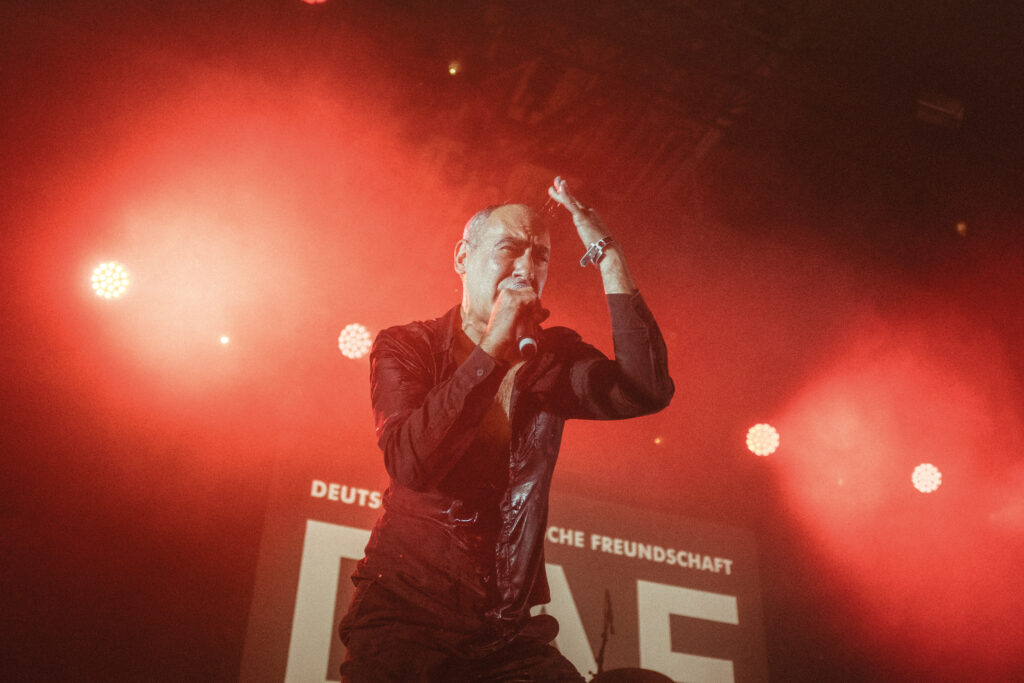
In words and image, DAF subverted (ambiguously, it must be said) notions of rigid self-empowerment and physical perfection, with concomitant fascist overtones. Did Görl recoil when Delgado brought him the idea for ‘Der Mussolini’, in which the listener is invited, or rather commanded, to do dance manoeuvres in honour, variously, of Jesus Christ, Hitler and the titular Italian demagogue?
“No,” he says, offering some insight into his creative process. “Robert was playing with some knobs, I was dancing to it and I said, ‘That’s a great sequence’. When I went in the studio, I only had one word: ‘Mussolini’. I thought, ‘That’s good. What should I do with Mussolini? I know, ‘Dance The Mussolini’. Then, OK, if you dance the Mussolini you must dance the Adolf Hitler and the Jesus Christ. Then go to the left, go to the right, clap your hands, move your booty’. It was a disco song!”
Delgado, a dancer fond of flamenco, was, he claims, suggesting Mussolini’s speeches were a form of dance. He was, with ‘Der Mussolini’, critiquing not just political dictators, but religious leaders and rock stars prone to similar displays of peacockery.
“The Pope, Mick Jagger, Adolf Hitler, Joseph Stalin – all the same,” he says. But listening to Görl’s brutal electro riff and its vocal counterpart, Delgado’s sinister, harsh, cracked vocal, you could imagine some listeners misinterpreting it all. Did DAF ever attract the wrong element, most conspicuously to gigs?
“Of course,” Delgado says, “but only a few.”
Luckily, DAF had “weapons” (Delgado’s word) in their arsenal, such as ‘Der Räuber Und Die Prinz’, a rare soft DAF song, one with the sing-song quality of a children’s nursery rhyme.
“So they’d Sieg Heil one minute, then a few seconds later it would be, ‘Homosexual bastards’! In the early-80s, there was a lot of violence at concerts. It was a violent time.”
He remembers a show in Rome that became the site for a confrontation between right wing extremists and left wing fanatics, both drawn to the event because a bunch of the former had beaten one of the latter to death a few days before and a local radio station decided to announce the arrival in the city of DAF, “a fascist band”.
“The left and the right fought in front of the stage,” Görl recalls with a shudder.
“With bottles and knives,” chips in Delgado.
“There was,” the drummer winces, “blood everywhere.”
The singer, who admits he has “had a lot of experience with violence and sex”, even had a knife held to his stomach by a skinhead. Fortunately, he had another weapon: his disarming charm.
“When this guy came towards me with his knife, I took his hand,” he explains, gently clasping your man from Electronic Sound’s left hand. Then he starts to stroke it. “It was like petting. I turned a violent gesture into something tender.”
DAF gigs became excuses for celebration as well as confrontation, while their albums seemed designed for hardcore clubbing, with all that entailed. There were a lot of songs about sex, the underwater variety or otherwise. No wonder they attracted an extreme contingent.
“Our audience dressed sexy,” Görl marvels. “You could see they were really extraordinarily weird people.”
This prompts a more recent reminiscence from Delgado, a regular back in the day, he reveals, of London’s notorious fetish club Skin 2.
“Two years ago, when we played in Kreuzberg, there were people fucking on the dancefloor while we were playing.”
“Why not?” responds Görl. “We attracted really sex-oriented people. A gay crowd. These really hard leather tough gay guys.”
This demographic must have welcomed DAF. It might have been a thriving period for flamboyant characters such as Boy George, Marilyn, Marc Almond and Steve Strange, but there was something cuddly about them at a time when homosexuality was, as Delgado reminds us, still something of a taboo, especially in Germany.
DAF were more like prototypes for Holly Johnson and Paul Rutherford, the “ferocious homosexuals” fronting Frankie Goes To Hollywood as Paul Morley promoted them.
“Sometimes the gay guys liked us so much, they’d be euphoric,” Görl reminisces. “They’d want you after the show. We’d be, like, ‘Take it easy, guys’!”
In 1980, DAF had moved from Düsseldorf to London and were squatting in Camden Town.
“Life was a struggle,” says Görl. By 1981, their domicile was somewhat plusher: an apartment on swanky Holland Road in West London.
“We never wanted to stay as squatting guys, living a shitty life,” notes Görl.
“We were very ambitious,” adds Delgado. “We wanted to be famous and rich.”
They were on the cover of the NME, pop stars in Germany, the toast of new romantic London, hanging out with Steve Strange and Frank “Fad Gadget” Tovey and playing the Blitz club. Delgado even briefly shared a flat, as well as a lover, with Nick Cave.
“We were in love with the same person at that time, it was very dramatic,” he says. Although his accent is heavy, he might well have said “traumatic”.
By 1982 and ‘Für Immer’, their work was done. Their sound had been successfully absorbed into pop’s body politic and it was time for DAF to step aside. They recorded one more album, ‘1st Step To Heaven’ in 1986 before Görl and Delgado went their separate ways. Since then, they have recorded several solo albums, and reunited as and when the mood takes them. But then, theirs was a relationship based less on friendship than function.
“We never meet when we’re not working on DAF. We never socialise,” reveals Delgado, who is appalled by any displays of faux chumminess. “It’s too comfortable. Sometimes I hear bands saying, ‘The concerts were okay, but we had a lot of fun drinking and the nightlife’. I don’t like this. If you want to change the world with music or art, you must have discipline. You can’t relax. I don’t want my best buddy onstage, I want a professional. I’m sure Mick Jagger and Keith Richards are like Robert and me – together, they work. I don’t think they’re friends.”
Their relationship is so “un-cosy”, there is literally a rupture of the narrative of the duo as a unit every so often as they pursue their own interests: Görl in Berlin and Delgado in Andalusia and Miami where, he tells us, he makes most of his money via “property and art”.
“Exactly,” he agrees. “People say, ‘Oh, you split again and get back together again’. We don’t really do that. We’re two different artists with different ways of being and different circumstances of living and social relationships. We’re more like two planets, with their own orbit, who every 30,000 years come together then drift away again.”
So much for the myth of the rock band as gang. What do they believe is DAF’s legacy?
“We made music that was more track-oriented, that doesn’t have an A and B part and a refrain,” Delgado says of DAF’s linear thrust, before moving on to assess the force of their music and its power to effect change.
“There is no other discipline in art like music, which is able to evoke such deep feelings, that bring back long-forgotten memories, even smells,” he says. “And there is no other form so radical to change the world like words, look at the ‘Bible’, ‘Das Kapital’. When the two come together at the same time, it is very strong.
Robert’s music and my lyrics fit together so well, you evoke a feeling at the same time as giving people a message.”
“That combination of feelings and ideologies,” he concludes with a final flourish as he and Görl head back to their hotel rooms, and their respective planets, “that’s what changes the world.”
‘DAS IST DAF’ is out on Grönland
